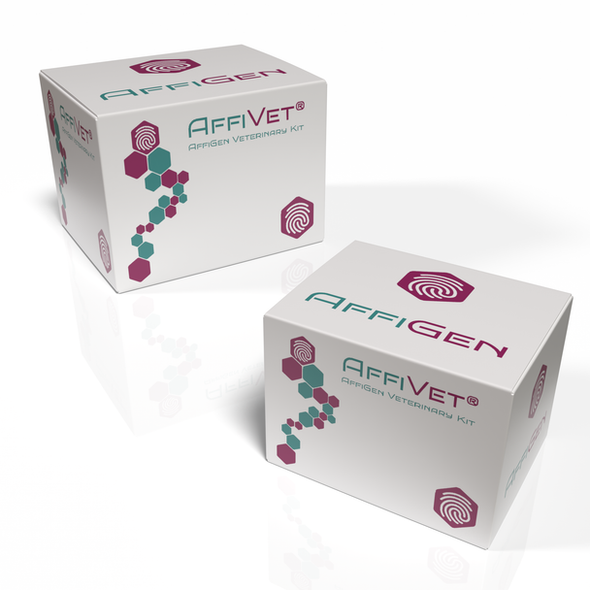Description
Avian EDS76 antibody ELISA kit
1. Usage
This kit is used to detect Avian EDS76 virus antibody in chicken serum, to assess antibody condition by Avian EDS76 vaccine in chicken farm and assist diagnosis of serological infected chicken.
2. Principle
The Avian EDS76 antibody ELISA kit is based on an indirect enzymatic immunoassay (Indirect ELISA).The antigen is coated on plates. When a sample serum contains specific antibodies against virus, they will bind to the antigen on plates. Wash the unbound antibodies and other components. Then add a specific enzyme conjugate. After incubation and washing, add the TMB substrate. A colorimetric reaction will appear, measured by a spectrophotometer (450 nm).
3. Reagents
1) EDS76 antigen coated microplate 2 piece (96 wells)
2) Enzyme conjugate 1 bottle (21 mL/bottle)
3) 10×concentrated washing buffer 1 bottle (50 mL/bottle)
4) Substrate A /B 1 bottle each (11 mL/bottle)
5) Sample dilution 1 bottle (100 mL/bottle)
6) Stop solution 1 bottle (11 mL/tube)
7) Negative control serum 1 tube (1.6mL /tube)
8) Positive control serum 1 tube (1.6mL /tube)
9) Serum dilution plate 2 piece
10) Adhesive film 4 pieces
11) Instruction 1 piece
4.Materials required but not provided
1) Micropipettors and disposable tips: 0.5μL~10μL、10μL~100μL、100μL~1000μL
2) Disposable tips
3) 37 ℃ Incubator
4) Measuring cylinder: 500 ml
5) 96 wells microplate reader
6) Distilled water or deionied water
7) Bottle or microplate washing machine
5. Sample preparation
Take animal whole blood, make serum according to regular methods, the serum should be clear, have no hemolysis.
6. Preparation of washing buffer
Return washing buffer to room temperature before use, if there is salty crystals, shake to make the crystals dissolve, then use distilled water or deionized water to dilute it at 10 times. The diluted washing buffer can store for 1 week at 4 ℃.
7. Sample dilution
At serum dilution plate, dilute serum at 1:99 with sample dilution (for example: 495μL sample dilution + 5μL serum)
Notice: Negative control serum and Positive control serum do not need dilute. Exchange tip after taking sample every time, record the situation of the sample on plate accurately. Shake the sample evenly before adding it.
8. Notes
1) All reagents should be adjusted to the room temperature and shake evenly before using, store at 2-8 ℃after using
2) Do not exchange the reagents from the kits of different lot numbers to use. Avoid reagent pollution when using.
3) Substrate and stop solution may be excitant to skin and eyes, pay attention when using.
4) Do not expose TMB (Substrate B) to light and avoid it contact with antioxidants.
5) The wells should avoid damp or touching water after unsealing (Put the un-using microplate back to bag with dehydrator in 2~8 ℃soon )
6) Deal all waste reasonable before dumping to avoid pollution.
7) Strictly adhere to instruction to get best result. All procedure including pipetting, timing and washing etc. must be accurate.
8) Serum dilution plate is disposable, do not use for second time; the MAX volume of it is 300μL/well.
9. ELISA procedure
1) Take pre-coated microplate (Can unseal for several time use as per sample quantity), add 100μL diluted serum to a well, meanwhile set 1 wells for Negative control serum, Positive control serum and blank control wells separately. Add 100 μL Negative/Positive control serum to its wells, only add 100μL sample dilution in the blank control well. Shake softly, do not overflow,incubate at 37℃ for 30 min.
2) Pour the liquid out of the wells, add 250 μL diluted washing solution to each well, static for 1 min, pour out. Repeat 3 times, then pat to dry on absorbent paper.
3) Add 100μL Enzyme conjugate to each well, shake softly andincubate at 37℃ for 30 min.
4) Repeat the step 2(washing). Remember pat to dry on absorbent paper at last.
5) Add 50 μL substrate A, then substrate B (50 μL) to each well, mix properly,react for 10 min atdark at37℃ in dark.
6) Add 50 μl of stop solution in each well, and measure the result within 10 min.
10. Results
Set zero at the blank control well, and test the OD450nm (630 nm as reference) value on the microplate-reader. The conditions for the test to be tenable are that the positive control wells’ average OD450nm value is greater than or equal to 0.6, and the negative control wells’ average OD450nm value is less than 0.15. If the test is invalid, the operation procedure is skeptical, run the test again and observe all the reagents carefully.
If the sample’s A450 value is greater than 0.2+ absorbance of negative control, it is judged to be positive; and if less than 0.2+ absorbance of negative control, negative. If absorbance of negative control is less than 0.05, calculate as 0.05
Specifications: 96*2 wells/kit.
Expiry date:12 months.
Storage: Storing at 2-8℃, in the dark.
2 Reviews
-
Quality
This seems like a good option for poultry farmers who want a convenient test for EDS76. It's important to consult the manufacturer's information and potentially seek reviews from other farmers before purchasing.
-
Quick shipping
Gentaur always fulfill its promise. They always shipped their prodcuts on time without any delay. Highly recommended!






